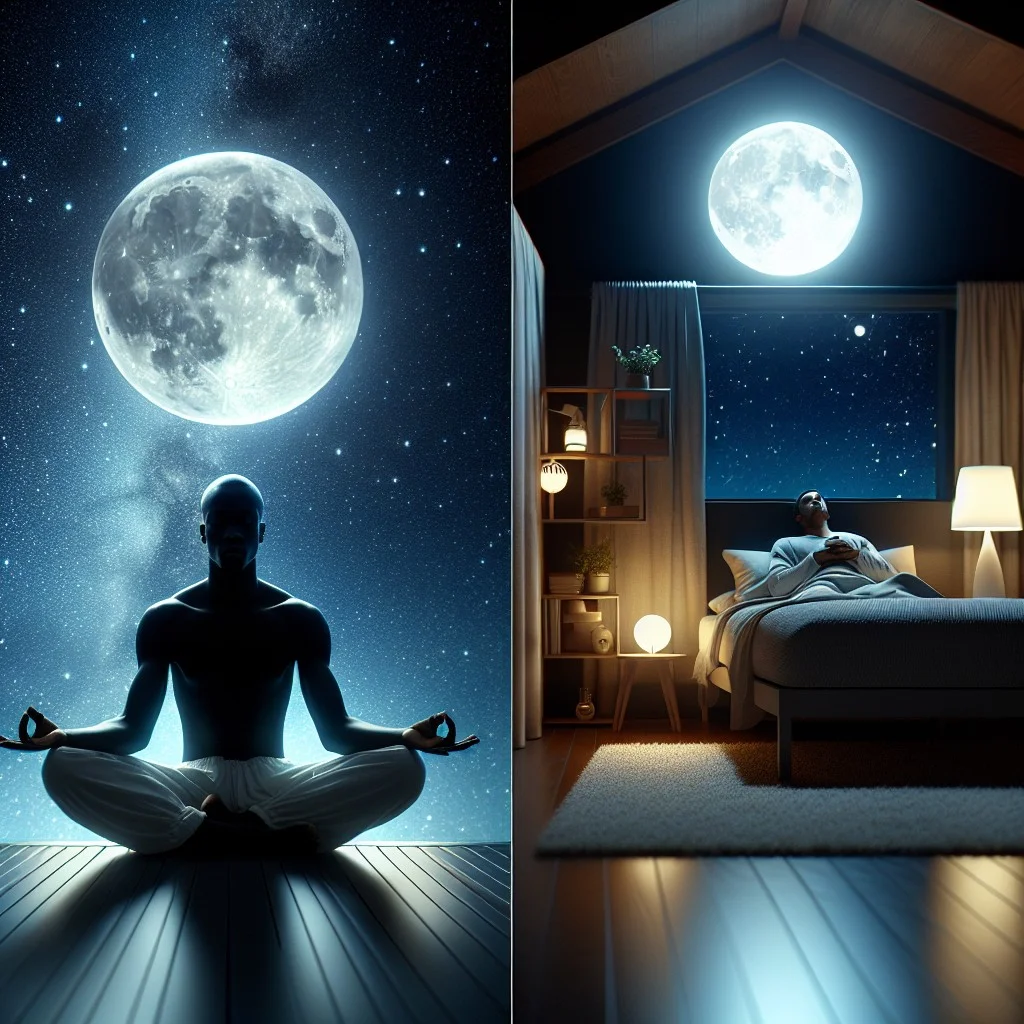No, meditation does not count as sleep, but it can help improve sleep quality.
Meditation, although deeply restful and rejuvenating, does not replace the physical need for sleep. This practice of mindfulness and focused attention can indeed reduce stress and promote relaxation, but it differs fundamentally from sleep, serving a distinct purpose.
As you delve deeper into this article, you’ll find an in-depth exploration of the differences between meditation and sleep, the unique benefits of each, and ways to incorporate both into your daily routine for optimal wellbeing.
Key takeaways:
- Meditation does not replace sleep, but can improve sleep quality.
- Sleep is essential for physical health, memory, and immune function.
- Meditation promotes relaxation, reduces stress, and enhances focus.
- Both sleep and meditation are important for overall wellbeing.
- Incorporating meditation into pre-sleep routines can improve sleep.
Understanding the Importance of Sleep

Optimal physical health, mental agility, and emotional stability are grounded in sound sleep. Sleep is a restorative process, heightening the body’s defenses, regenerating cells, and normalizing hormonal imbalances. Additionally, a good night’s rest enhances learning and memory by providing the brain respite, which aids in consolidating new information.
Neglecting healthy sleep patterns can lead to a myriad of health issues such as weakened immunity, cardiovascular diseases, and mood disorders. Cognition can be impaired, resulting in decreased creativity, problem-solving abilities, and attention span. A lack of sleep may also increase the risk of accidents due to diminished reaction times.
Sleep deprivation not only drains energy levels but also leads to weight gain by impacting hunger hormones. Over time, inadequate sleep routines have the potential to shorten life expectancy. Despite busy schedules or habitual late-night activities, understanding the essential role sleep plays in overall health is vital.
Prioritizing sleep hygiene includes setting a consistent sleep schedule, creating a tranquil sleep environment, and incorporating relaxation techniques before bedtime. Sleep is a cornerstone of a healthy lifestyle, and treating it with the respect it deserves is integral to maintaining overall wellness.
The Fundamentals of Meditation

Meditation, a timeless practice with roots in ancient traditions, elevates one’s state of awareness and focus. It involves fostering a deeper understanding of the mind, emotions, and thoughts. Here are some essential concepts behind this technique.
1. Awareness: This pertains to being fully aware of one’s surroundings, thoughts, and feelings without any judgment.
2. Present Moment: Meditation encourages dwelling in the present moment, letting go of past regrets and future anxieties.
3. Breath Focus: Concentration on the rhythm of breathing helps to achieve a sense of calm and focus.
4. Mindfulness: This refers to fully engaging and being in harmony with one’s current actions and thoughts.
5. Non-Judgment: Accepting experiences as they are without labeling them as right or wrong.
Remember that with practice, anyone can excel in meditation. The key lies in patience, consistency, and positivity. There’s no goal to reach; it’s the process that counts.
Exploring the Benefits of Meditation

Meditation offers a range of benefits for mental and physical health. Through consistent practice, individuals can achieve stress reduction, cultivating an inner sense of peace and calm. By directing attention away from chaotic thoughts, meditation aids in enhancing focus, ultimately leading to improved cognitive functioning.
Another profound benefit is the bolstering of emotional health. Regular meditation is known to lengthen attention span, fight against memory loss, and even generate kindness by building skills to manage your stress better. Further, it can aid in curbing addictions by instilling self-control and increasing awareness of triggers for addictive behaviors.
Beyond mental health gains, the practice of meditation can have apparent positives on physical health, too. It aids in reducing blood pressure by relaxing the nerve signals that coordinate heart function, tension in blood vessels, and the “fight-or-flight” response that increases alertness in stressful situations. Also, mediation improves sleep by enhancing the release of melatonin, the sleep hormone, and decreasing heart rate, promoting easier onset and better quality of sleep.
Let’s delve a bit deeper into the link between meditation and sleep.
Does Meditation Replace Sleep?

Indeed, the practice of meditation brings forth numerous health benefits, which can be similar to those offered by a good night’s rest- from reducing stress to improving cognitive functioning. However, it doesn’t function as an exact substitute for sleep.
Here’s why:
- 1. Sleep serves to rejuvenate the body by promoting growth and repair of tissues and muscles, functionality not mirrored by meditation.
- 2. The sleep cycle allows for complex neurological processes such as memory consolidation and removal of toxic waste from the neurons. While meditation can indeed enhance memory and clarity of thought, it does not aid in these key physiological processes.
- 3. The body needs sleep to regulate hormones and maintain an optimal immune system, functions that meditation can assist, but not replace.
Therefore, despite the health advantages that meditation brings, it is important to understand it does not serve as a direct replacement for sleep. Both practices are essential to maintain a healthy body and mind.
Comparing Meditation and Sleep
While both meditation and sleep focus on relaxation and reinvigoration, they serve different purposes in our well-being. Meditation, mainly a state of deep concentration where the mind is directed inward, enhances mindfulness, reduces stress, and cultivates an overall tranquil state of being. It’s an active process where we retain control over our mind and attentively guide the energy flow.
On the contrary, sleep is a passive process and a physiological necessity, requiring us to let go control. During sleep, our body undergoes recovery processes – repairing tissue, regenerating cells, and releasing important hormones. Sleep stages, especially REM (rapid eye movement), play a crucial role in memory consolidation and learning.
Moreover, meditation impacts specific regions of the brain differently than sleep. While meditation boosts the prefrontal cortex (linked to decision making and cognitive behaviors), sleep strengthens the neural connections that play a critical role in our emotional and procedural memory.
Impact of Replacing Sleep With Meditation
Scientific studies suggest that although meditation doesn’t replace sleep, it does help in enhancing the quality of rest one gets. Attempting to switch out sleep with long meditation sessions could have detrimental effects. Sleep aids physiological changes that are not replicated in a wakeful meditative state. These include muscle repair, tissue growth, hormone release, and other vital functions.
Over time, this replacement might lead to fatigue, reduced productivity, compromised cognitive functions, memory recall issues, and even weakened immune response. These consequences underline the fact that while meditation bears unique benefits, maintaining regular sleep schedules remains equally vital.
However, incorporating meditation into your daily routine, particularly before you sleep, has shown to promote deeper, more rejuvenating sleep. It helps reduce stress, anxiety, and helps to manage insomnia – further underlining the beneficial synergistic relationship it has with sound sleep.
The Effects of Insufficient Sleep
When sleep is insufficient, several cognitive and physiological complications can arise. To start, weakened immunity often becomes prevalent, resulting in frequent ill health. Cognitive functioning also experiences a toll, with memory problems and reduced concentration becoming common. Other consequences include mood fluctuations and increased risk of chronic diseases such as heart disease and diabetes. Even more problematic is the impact on mental health; a lack of sleep often aggravates conditions like depression and anxiety. In severe cases, sleep deprivation can even mimic symptoms of psychosis.
Techniques for Efficient Meditation for Better Rest
To kickstart your journey to a better night’s rest, you should apply these efficient meditation techniques, often aimed at calming the mind and reducing worry, stress, and anxiety.
1. Body Scan Meditation: This technique involves mentally scanning your body from head to toe, focusing on each part, releasing tension and achieving overall relaxation.
2. Guided Sleep Meditation: Many apps and online platforms provide step-by-step guidance to help you enter a state of deep relaxation.
3. Mindfulness Breathing: Concentrating on inhales and exhales, allowing thoughts to come and go, can assist you in falling asleep quicker.
4. Yoga Nidra: A deep relaxation technique, also known as ‘yogic sleep’, takes practitioners to the borders of wakefulness and sleep for profound relaxation.
5. Progressive Muscle Relaxation: This technique is about gradually tensing then releasing each muscle group to promote physical relaxation.
6. Visualization Techniques: Create a peaceful scenario in your mind and immerse yourself in its tranquility. The soothing effect often leads to sleep.
Employ these methods as part of your nightly routine to help the transition between wakefulness and sleep. They can enhance not only the quantity but also the quality of your sleep.
Achieving Mindfulness Through Meditation
In cultivating mindfulness, deliberate focus, patience, and regular meditation are crucial elements. Here is a concise explanation of ways to achieve mindfulness through meditation:
- Fixed Attention Meditation: This technique involves focusing on one specific thing. It could be a sound, image, or your breath. It helps in enhancing your concentration and awareness.
- Open Monitoring Meditation: Here, you pay attention to all the happenings around you without reacting. It can be very useful in fostering a better understanding of the interplay between mind, body, and environment.
- Loving-kindness Meditation: This method encourages a positive attitude towards all beings. It aids in fostering empathy, compassion, and positivity.
- Progressive Relaxation: This technique involves fostering a sense of relaxation by tensing and relaxing each muscle group. It can help individuals in feeling calm and collected.
Incorporating these types in your routine cultivates clarity, attention, and appreciation for the present moment. As a result, your mindfulness deepens and expands.
The Connection Between Meditation and Quality Sleep
Emphasizing mindfulness, meditation encourages a deeper state of relaxation and heightened awareness. This tranquil state can help subdue the mind’s overactivity, often a major obstacle to sleep. Incorporating meditation in pre-sleep routines can contribute to a smoother transition into sleep and may even boost the overall quality of sleep due its calming effects.
Additionally, meditation assists you in managing stress, reducing anxiety, and improving concentration, all elements that are conducive to a better night’s sleep. Here’s how it does:
- Reduces Mental Clutter: Meditation aids in the release of the day’s worries and distractions, paving the way for a peaceful slumber.
- Enhances Melatonin Levels: Regular meditative practice has been linked to increased production of melatonin, a hormone essential for regulating sleep.
- Promotes Parasympathetic Nervous System: Meditation increases parasympathetic activity, which leads to decreased heart rate and blood pressure, effectively preparing the body for sleep.
- Stimulates Serotonin Production: Serotonin, a neurotransmitter known to regulate mood and social behavior, is also essential in promoting sound sleep, and meditation can potentially increase its production.
Remember, while meditation can foster better sleep, its intention is not to induce sleep but to cultivate a more reflective, less reactive state of mind. Sleep is a passive condition while meditation is an active process.
FAQ
Is 20 minutes meditation equal 4 hours sleep?
No, 20 minutes of meditation is not equivalent to 4 hours of sleep; however, experts indicate that it is comparable to 4-5 hours of deep sleep.
Is 10 minutes of meditation equal 4 hours sleep?
No, 10 minutes of meditation is not equal to 4 hours of sleep; humans generally need at least 4-6 hours of sleep for optimal functioning, with meditation potentially supplementing the remaining sleep requirement.
Is 30 minutes of meditation equal 4 hours sleep?
No, 30 minutes of meditation is not equivalent to 4 hours of sleep as both serve distinct purposes and the human body typically requires 7–9 hours of sleep per 24 hour cycle irrespective of meditative practices.
Can I just meditate instead of sleeping?
While meditation can enhance short-term mental performance and reduce the need for rest, it cannot completely replace the physical need for sleep.
How does the rest achieved through meditation compare to normal sleep?
Meditation allows for conscious relaxation and increased mindfulness, while sleep is an unconscious state that restores physical energy; both are important, but they serve different purposes in promoting overall wellness.
Can the effects of sleep deprivation be reversed through meditation?
While meditation, specifically mindfulness meditation, can help alleviate some symptoms of sleep deprivation by reducing stress and promoting relaxation, it should not be considered a complete replacement for adequate sleep.
Does practicing transcendental meditation provide any sleep benefits?
Yes, practicing transcendental meditation enhances the quality of sleep by reducing anxiety and promoting deep relaxation.